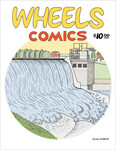
The final (major) piece in the puzzle of the Lynchian oeuvre is at last in place. Employing the great American metaphor of driving -- in a highly coded manner that takes one bizarrely twisted turn after another -- Lost Highway shows us the innermost workings of a psyche (in more ways than one, Lynch's own) that failed to successfully navigate the transition from childhood to adulthood and so remains trapped in a state of traumatized adolescence where identity remains in a constant state of transitional flux and the real and the imagined are never far apart. Or something like that. Not to mention the cool soundtrack. Get creeped out, freaked out, wigged out and more!

It is safe to say that David Lynch films are like no other films, and that his stories operate much closer to the edge of consciousness and adhere more closely to the logic of dreams than typical Hollywood fare. His plots twist and turn in on themselves like a möbius strip that a cat's gotten a hold of, and it's easy for the casual viewer to get lost; but that's precisely the point. Lynch always aims to destroy the cosy sense that all is right with the world which is the goal of the majority of films, especially those emanating from southern California. Where other forms work to achieve closure, Lynch works to plunge his audience into the abyss that lurks just below the surface of quotidian normalcy. Nowhere is this tendency more evident than in his latest release. Inland Empire is, when you get right down to it, an art film, of the type that is usually a tiny fraction of its length. Its disjointed, discontinuous narrative works to portray how modern consciousness has been subjected to a fundamental reformation as a result of its virtual submersion in the the alternate reality of artificial moving images that surround us in a multiplicity of forms delivering the basic mediums of film and video (which are beginning to merge in the medium of digital video, which, signifigantly, Inland Empire was entirely shot in). The age old sense of a single, contained, isolated and particular self (which may very well have been illusory to begin with) has, in the Lynchian view, given way to a continuous, connected field in which the individual's identity, and, indeed, his or her very being, is constantly in a state of flux and can, at times, be located in other bodies and places, even, at times, those that do not physically exist, but are instead creations of the self same mediums that are responsible for this transformation. Confusing? You bet, but, again, that's the idea. To delve more deeply into Inland Empire, read Dennis Lim's review (complete with clips from the film) at Slate. This 2-disc DVD release features a whopping 211 minutes of bonus material, including 75 minutes of additional scenes referred to as "More Things That Happened." This addition extends the total running time of the film to a vertigo-inducing 254 minutes, so make sure you brew a strong pot of coffee before settling in to watch it (you might even want to consider brewing Dave's own personal roast).










